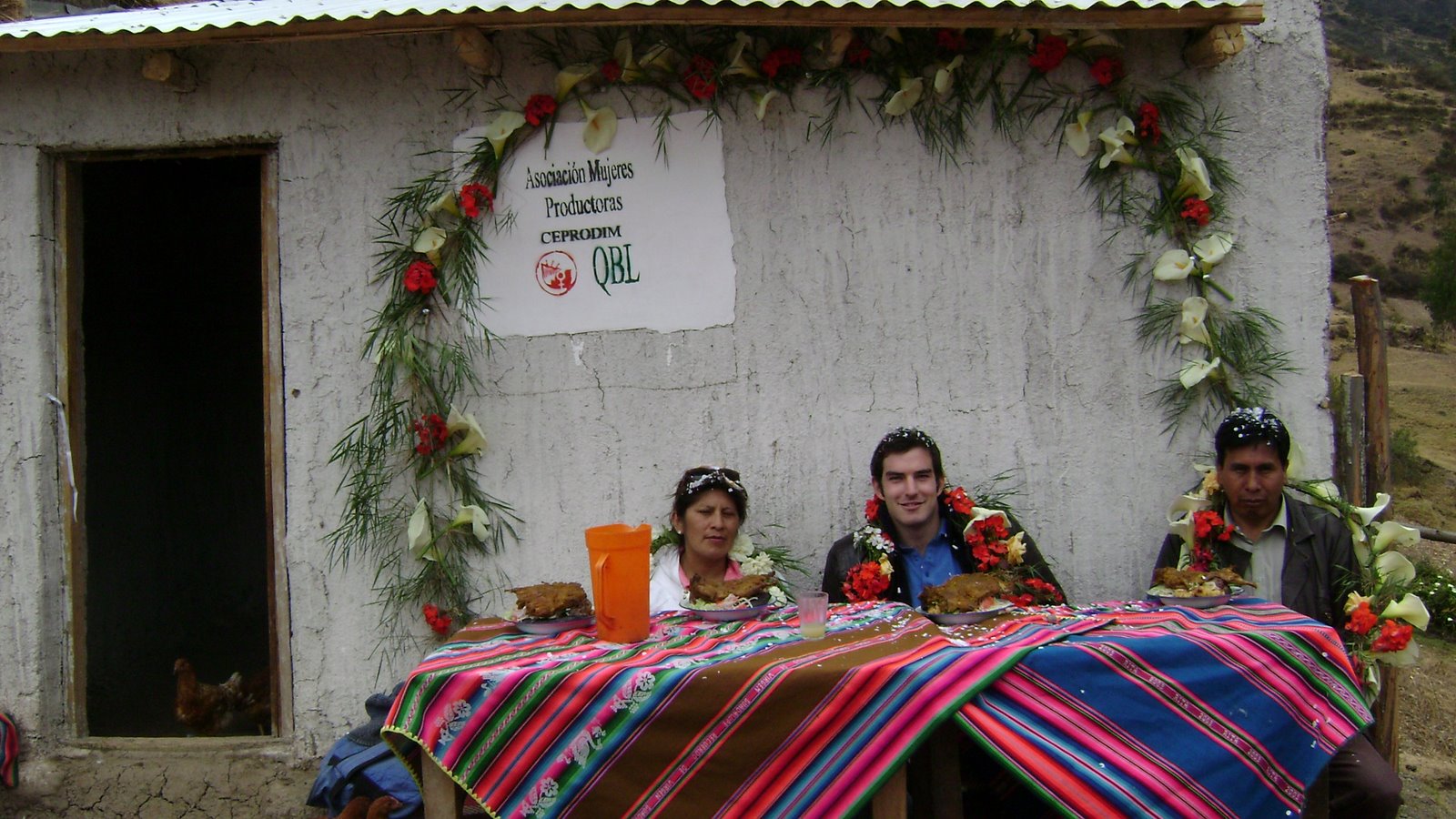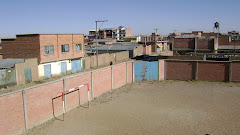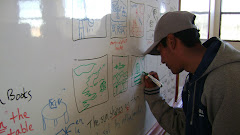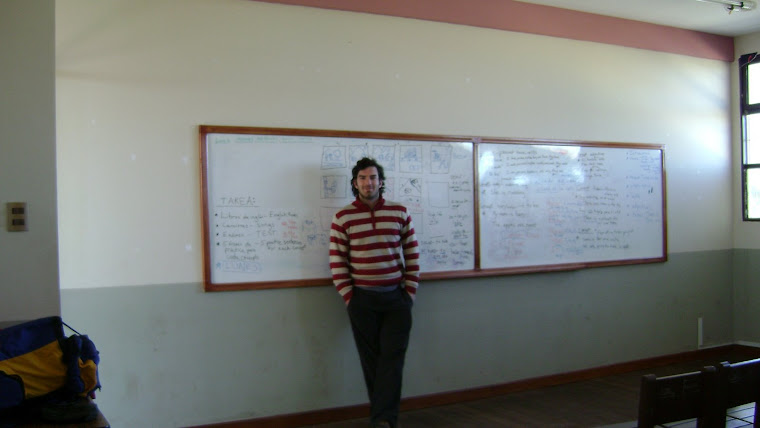Here are some impressions of mine about the current political situation. I got a number of emails asking me how I was and if it was still safe here especially last may 4th. SO......
The press isn´t amping it up- the country is divided. As far as how the press from the Nytimes describes the race relations I think they're prettyclose. As for the underlying economic and political relations, they get it sometimes although if you've read as many articles as I have over the past 4 years from the Times, they like to recycle information, phrases, impressions, and political summaries. I'm about 2/3 through the new constitution that was passed in dec. 2007 by Morales' party MAS in Oruro. It's dense, long, and more like a massive public policy document as opposed to a general guideline; it creates a national health care plan, land distribution, state control of telecommunications, and natural resources to name a few. It is somehwat under scrutiny because some of the constituent delegates who weren't with MAS or opposed to their proposal left the table after MAS lost the 2/3's vote on their version. At that point MAS tried to change it to a simple majority to pass it and thats when the other delegates from Santa Cruz and other deptartments left. Still, from most accounts, the constitution is considered legitimate although controversial ( I'm still trying to piece things together).
So on may 4th Santa Cruz decided to have a referendum on their autonomous statutes which I am in the process of reading- more or less it would involve much more local control over natural resources like gas and agriculture. They would also have their own police force and would recognize only a couple indigenous communities that are original to their dept. as ¨original¨or indigenous, as opposed to immigrants from la paz or other depts. who have moved there in more recent times. The referendum is not legitimate from most anyone's perspective but some give it "legitimacy"because it's a show of public opinion. Although about 38% of the people abstained( a couple voting stations were blocked by protestors but it wasn't overly significant), 85% of the people who did vote were in favor of the statute ( the vast majority of whom hadn´t read the actual statute nor the new constitution).
Some say Santa Cruz is crying over the fact that they have to pay taxes to the state and give up more control to the state- they're the economic engine of the country. Addittionaly, blatant racism exists in those regions as in much of the country. Demographically and many times economically speaking it's a "naturally" divided country. That has been the case for it's entire history, however.
On one hand, you gotta love Evo Morales. He's the first indigenous president and therefore in a crude way represents the 60% of the country here who consider themselves indigenous. He's radical but won in landslide victory two years ago- people wanted a change from failed neoliberal economic policies, sovereignty from the developing world including U.S. policy preferences, and the ability to control natural resources. If you've read anything about "development"after the 2nd world world, the failing war against drugs, the massive unemployment resulting from neoliberalism, and the drastic economic crisis in Bolivia in the past 10 years- you sympathize in a lot of ways. Of course there are good sides to the reforms in the 90's like bilingual education from '94 and the improved status of women. I won't get into the long and complicated discussion here. Still, Morales is controversial.
When it comes to Democracy I'm not sure if I agree with Morales since a large number of people in other departments want some kind of autonomy- more than the current constitution affords. For example, Pando and Beni recently voted for autonomy and of those who voted about 80% were in favor of the statute while obviously more or less 20% were against. At the same time, there was about a 30% abstention rate. Morales has pointed out in these votes that the abstention rate combined with the "no"vote still supports his position against autonomy- some 50% of the population in one way or another against it.
Morales is in a very tight political position and is gonna have to negotiate at some level since it is clear there are significant divisions. On August 10th Morales has called for a Referendum Revocatorio- he's offering himself and the departmental Prefects up to the people for a vote of confidence. The prefecturas, for the most part, are opposed to Morales and act as the primary filter for funds from the State among other things.
In a country where poverty is so high I think the state has to step in and allow for capitalism to do its job but, as one can see in any developing country, the state has to take a significant role ( see Michael Mann or Peter Evans among others for some fun reading).
The debate is fascinating. For example, the new "MAS"constitution limits the amount of land people can have and would distribute land to mostly poor indigenous communities (I believe it is 10,000 hectares limit per person). It also allows for indigenous judicial rights within their community. Is that limiting personal rights or saving peoples lives and giving them some land to grow food on? Is it more in line with the Andean Cosmovision/ Communitarian vision? Is it against the liberalism most "modern democracies" are based on? If so, how would it respect personal freedom i.e. individual rights? Is there a system that's entirely capitalistic and market based- one that doesn´t control prices( note: the U.S. and corn markets especially considering ethanol subsidies) and land?
Another example: I don´t agree with Morales' periodic ban on exports( perhap I don't understand the economic rationale). He recently did it with oil ( cooking) a couple months ago in Santa Cruz because the internal market prices were too high. Just a week or so ago they limited the export of chicken and certain types of cornmeal. The gov. has a regulatory agency that supposedely knows what the market price should be. Therefore Morales by decree can ban exportation ( in the case of oil some estimates say they lost 100 million dollars because of the ban). About a month ago, they came to an agreement with producers in that they should sell domestic oil at a certain price and export at whatever they wanted sighting the ¨just¨price for a population so impoverished. These kind of agreements/ issues many times baffle me and are indicative of the incredible difficulty in finding a middle ground.
In a world of such hardball politics compromise is difficult to come by.
Overall, there have been spurts of violence. On may 4th things were calm in la Paz although there were marches in most places especially SC, dept. of cochabamba, and El Alto. A few injuries but major violence wasn't a problem. Things shouldn´t get bloody but they might get ugly. I'm fine in La paz for now, but no one knows whats in store for the country in the coming months.
I hesitantly express my opinions- sometimes the papers get it right, sometimes they don't. Sometime's what you hear from people is, as with many political discussions, misinformed and based on opinion or hearsay. Amid this tangled discussion and situation, I'm just trying to keep up on whether my favorite soccer team "The Strongest" ( Mascot, The Tigers) is still losing. And they are.
TIGRE, TIGRE!!
A FAO Greenhouse

One of the members in my training group taking a look at a plot of lettuce
Another Visit With QBL

We visited the innaguration for a series of new chicken coops QBL financed in a small village in the low-lying andes mountains, 7 hours north of La Paz
Wednesday, June 4, 2008
Subscribe to:
Posts (Atom)








